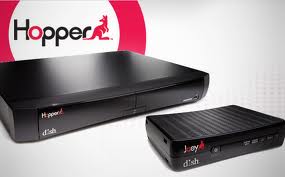 CNET was forced to withdraw a planned award for Dish Network’s ad-skipping “Hopper” DVR because the website’s owner, CBS, is suing the satellite dish company over the device.
CNET was forced to withdraw a planned award for Dish Network’s ad-skipping “Hopper” DVR because the website’s owner, CBS, is suing the satellite dish company over the device.
The rift has led to questions about the editorial independence at CNET, and as of this afternoon, a senior writer has quit over the controversy.
Greg Sandoval, who formerly reported for the Washington Post and Los Angeles Times resigned in protest less than one hour after reports surfaced CNET was ordered to disqualify Dish Network from consideration at the Best of C.E.S. Awards in Las Vegas last Thursday.
The well-advertised Dish Hopper DVR allows viewers to seamlessly skip past advertising on recorded major network primetime programming. CNET disclosed that regardless of the product’s merits, it could not be considered at the awards event because the website’s owner was actively engaged in litigation that argues the device violates U.S. copyright laws.
“We are saddened that CNET’s staff is being denied its editorial independence because of CBS’s heavy-handed tactics,” said Dish Network CEO Joseph P. Clayton. “This action has nothing to do with the merits of our new product. Hopper with Sling is all about consumer choice and control over the TV experience. That CBS, which owns CNET.com, would censor that message is insulting to consumers.”
The Verge website turned up the temperature in CNET’s offices when it reported the Dish Hopper was banned from consideration only after it became apparent it was going to win an award:
Before the winner was unveiled, CBS Interactive News senior-vice president and General Manager Mark Larkin informed CNET’s staff that the Hopper could not take the top award. The Hopper would have to be removed from consideration, and the editorial team had to re-vote and pick a new winner from the remaining choices. Sources say that Larkin was distraught while delivering the news — at one point in tears — as he told the team that he had fought CBS executives who had made the decision.
 The Verge added there was clear evidence of a growing influence on the editorial decisions at the digital news subsidiaries owned by CBS, all designed to protect the parent company.
The Verge added there was clear evidence of a growing influence on the editorial decisions at the digital news subsidiaries owned by CBS, all designed to protect the parent company.
Sandoval left almost immediately after The Verge went public with its report.
CBS released a statement earlier this afternoon:
CBS has nothing but the highest regard for the editors and writers at CNET, and has managed that business with respect as part of its CBS Interactive division since it was acquired in 2008. This has been an isolated and unique incident in which a product that has been challenged as illegal, was removed from consideration for an award. The product in question is not only the subject of a lawsuit between Dish and CBS, but between Dish and nearly every other major media company as well. CBS has been consistent on this situation from the beginning, and, in terms of covering actual news, CNET maintains 100% editorial independence, and always will. We look forward to the site building on its reputation of good journalism in the years to come.


 Subscribe
Subscribe
When I first heard about this whole situation, I couldn’t believe it. I work at DISH, and many of us were excited to be given such recognition for the new technology in our Whole-Home HD DVR. In truth, so many people are embracing the DISH Hopper and the fact that it allows for complete control over watching TV. I may not have time to sit through every commercial, so of course, I’m going to welcome a quicker way to fast-forward through commercials, and I love that it’s up to me to do so.